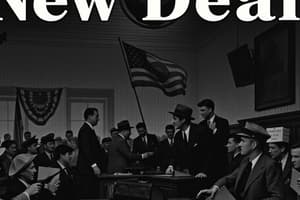Podcast
Questions and Answers
What is the main belief about the nature of deal-making described?
What is the main belief about the nature of deal-making described?
It is believed that deal-making is an innate ability that individuals are born with.
What does the author suggest people are generally afraid of when thinking small?
What does the author suggest people are generally afraid of when thinking small?
People are generally afraid of success, making decisions, and winning.
In what locations did the author express a desire to build, and why were they significant to him?
In what locations did the author express a desire to build, and why were they significant to him?
The author desired to build in Manhattan, as it represented a greater challenge and opportunity for monumental development.
How does the author describe the mindset of highly successful entrepreneurs?
How does the author describe the mindset of highly successful entrepreneurs?
What type of developments attracted the author and why?
What type of developments attracted the author and why?
What does the author imply is an essential factor in thinking big?
What does the author imply is an essential factor in thinking big?
Flashcards are hidden until you start studying
Study Notes
Deal-Making Philosophy
- Emphasizes a high-aim approach to deal-making, persistently pushing for desired outcomes.
- Settling for less is common, yet ultimate success is often achieved.
- Attributes successful deal-making to innate ability rather than learned skills.
Instinct vs. Intelligence
- Highlights that innate instincts are crucial to successful entrepreneurship.
- Suggests that traditional intelligence (e.g., high IQ, academic excellence) is insufficient without proper instincts.
- Many people with potential may not recognize or utilize their abilities due to lack of courage or opportunity.
Potential vs. Reality
- Compares potential in deal-making to natural talent in sports, noting that some may never discover their abilities.
- Reflects on personal experiences with deals made, lost, or overlooked, identifying common elements in successful outcomes.
Realism in Wealth Creation
- Warns against "get rich quick" schemes commonly promoted by real estate evangelists.
- Acknowledges that life does not guarantee immediate wealth, and many who seek quick riches often face financial loss.
- Prefers fewer competitors, indicating that the marketplace can be more challenging with an increase in skilled deal-makers.
Thinking Big
- Emphasizes the importance of thinking big over small, as most people’s fear of success limits their potential.
- Personal background includes growing up in a family involved in low and middle-income building projects in Brooklyn and Queens.
- Early aspirations included targeting prime locations, demonstrated by a preference for Forest Hills initially and later recognizing Manhattan as a greater opportunity.
- Motivation extends beyond financial success to making a significant impact through monumental projects.
- Aimed to undertake ambitious projects such as large-scale developments on the West Side of Manhattan and a transformative hotel next to Grand Central Station.
- Recognizes that combining a hotel with a casino generates exponentially higher returns compared to traditional hotel operations.
Keys to Success
- Attributes total focus and an obsessive drive as essential traits for thinking big and achieving success.
- Describes this focus as a "controlled neurosis" that propels entrepreneurs forward, enhancing their dedication to work.
- Highlights the competitive nature of New York real estate, where deal-making involves complex, high-stakes negotiations with formidable opponents.
- Personal enjoyment derived from competing and succeeding against the best in the industry, reinforcing a mindset geared towards challenge and victory.
Studying That Suits You
Use AI to generate personalized quizzes and flashcards to suit your learning preferences.





